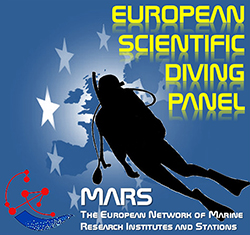The purpose of OSD is the undertaking and delivery of underwater science. It should not be confused with the use of diving for citizen science (cf. definitions below).
Definition and rationale for Occupational Scientific Diving
OSD is diving that is science‐led and is needed to support professional research and education and for the protection, conservation and monitoring of the natural and cultural heritage environment.
It is not recreational nor commercial diving.
OSD exists in a health and safety framework that involves certified scientific divers, diving officers, hyperbaric physicians, scientific project leaders, heads of laboratories, administrators and legislators.
OSD is a highly productive, cost‐effective “in situ” research tool that supports and advances marine research and archaeology through providing efficient, innovative and targeted techniques and methodologies for selective and efficient sampling and complex experimental work underwater (quantitative survey, quantitative observation, making in situ measurement, undertaking impact studies, performing ecological analyses, evaluating new techniques, mapping underwater areas, profiling subtidal geology/geochemistry, and accurate deployment/retrieval of underwater apparatus).
This is particularly effective for undertaking science in coastal or restricted/remote environments e.g. polar regions and under ice where OSD can offer an accurate and reliable method for deploying, maintaining and retrieving equipment in remote locations. Scientific Diving can be used to research global scientific questions including climate change, ocean acidification, seafloor ecosystem functioning, paleoclimate reconstruction.
OSD is becoming increasingly important as a relevant monitoring tool in support of policy needs, more particularly to address the monitoring requirements.
OSD is also consistent with the international demand for a responsible, resource-conserving, and sustainable research methodology in Europe.
Citizen Science Diving [CSD]: legal framework, aims, actors, and public are different
Citizen Science (= community science, crowd science, crowd-sourced science, civic science, volunteer monitoring) is scientific research conducted, in whole or in part, on a voluntary basis, by amateur (or nonprofessional) scientists.
Citizen science is sometimes described as public participation in scientific research, participatory monitoring, and participatory action research whose outcomes are often advancements in scientific research by improving the scientific communities capacity, as well as an increasing the public’s awareness and understanding of science.
The training of volunteer recreational divers to scientific specialties (marine biology or oceanology certifications) as organised by recreational diving agencies like CMAS or PADI is an added value. Aiming at the conscientisation of a broad public, it is a clear advantage for further participation to citizen science projects.
ESDP is encouraging such training aiming at providing valuable data to scientific research. However, those “scientific specialties certifications” like marine biology, fresh water biology, oceanology or geology, …, are not qualifying the owner to be contracted and employed as a scientific diver as defined above. In CMAS (2000, doi: 10.5281/zenodo.7698377), it is specified that the CMAS’ specialty courses were intended for amateur and non-amateur divers. But in no case, for the non-amateur divers will these courses be a professional or administrative scientific recognition; this is an aspect that belongs to the academic or administrative institutions of each country. This fits with the view of CSD.
